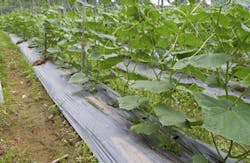Alternative to restricted-use nematicides registered by EPA
A new lower-risk pesticide ingredient for controlling plant parasitic nematodes has been registered by the U.S. Environmental Protection Agency (EPA).
The new active ingredient, fluensulfone, offers an alternative to restricted-use soil fumigants such as methyl bromide, which has been phased out because its use depletes the ozone layer.
Nematodes can cause significant damage by reducing crop yield and quality.
According to the EPA, fluensulfone is a non-fumigant nematicide that provides lower-risk chemical control of nematodes than methyl bromide and other soil fumigants that are classed as restricted use. Such products — which make up about a quarter of all pesticides used — may be applied only by or under the direct supervision of trained and certified applicators.
As a result, restricted use pesticides require special applicator training and certification, reporting and record-keeping and additional restrictive labeling to protect against human exposure. Moreover, soil fumigants can be labor intensive to apply.
Fluensulfone is used for pre-plant, bare-soil application when growing fruiting vegetables and cucurbits. These plants include cucumbers, melons, squash, tomatoes, okra, eggplant and peppers.
Seven main alternatives to fluensulfone have been used in the last five years, of which six (including methyl bromide) are soil fumigants and the seventh is a carbamate. All seven are restricted use pesticides, which may pose a greater risk to human health than fluensulfone, the EPA said.
